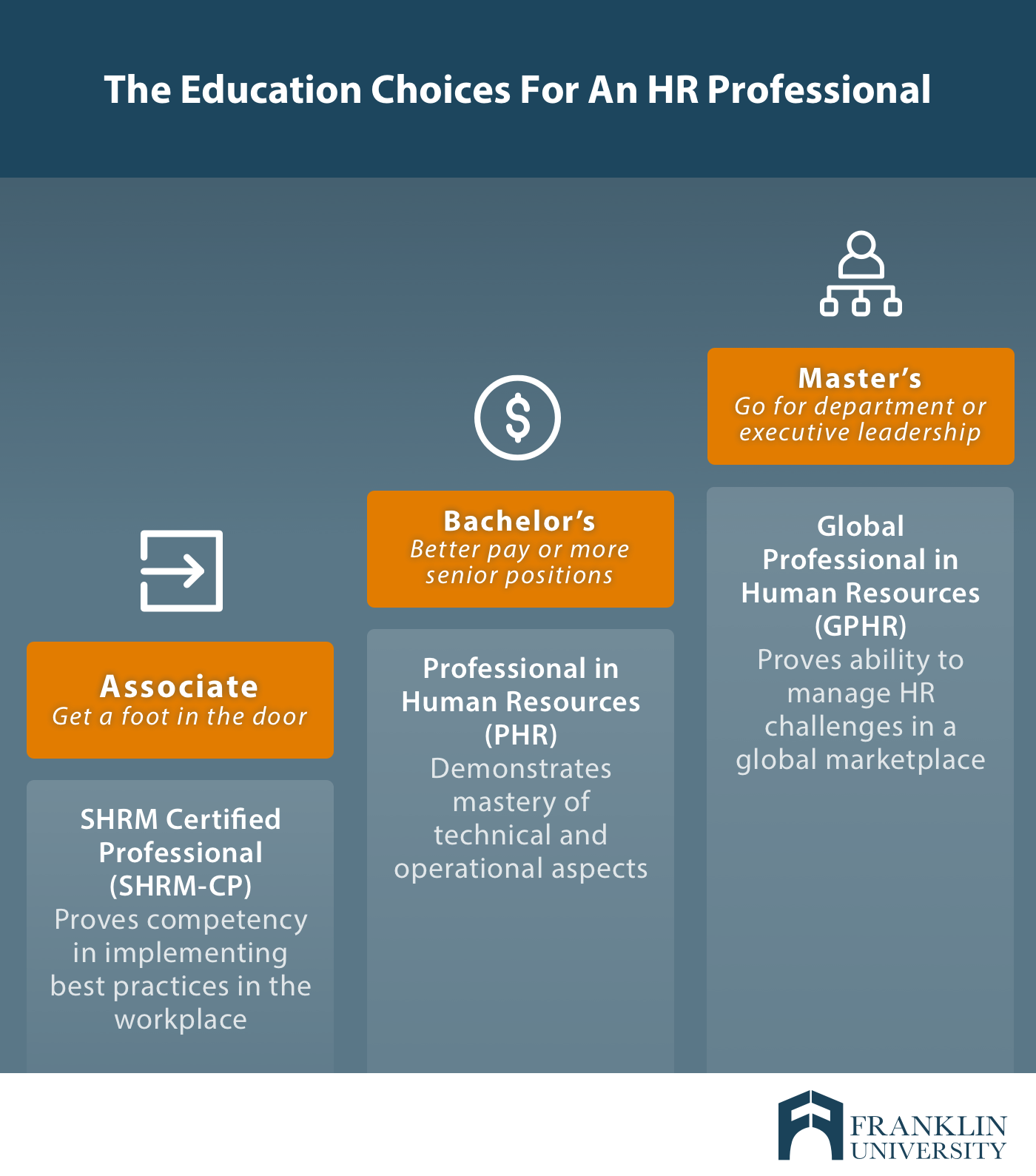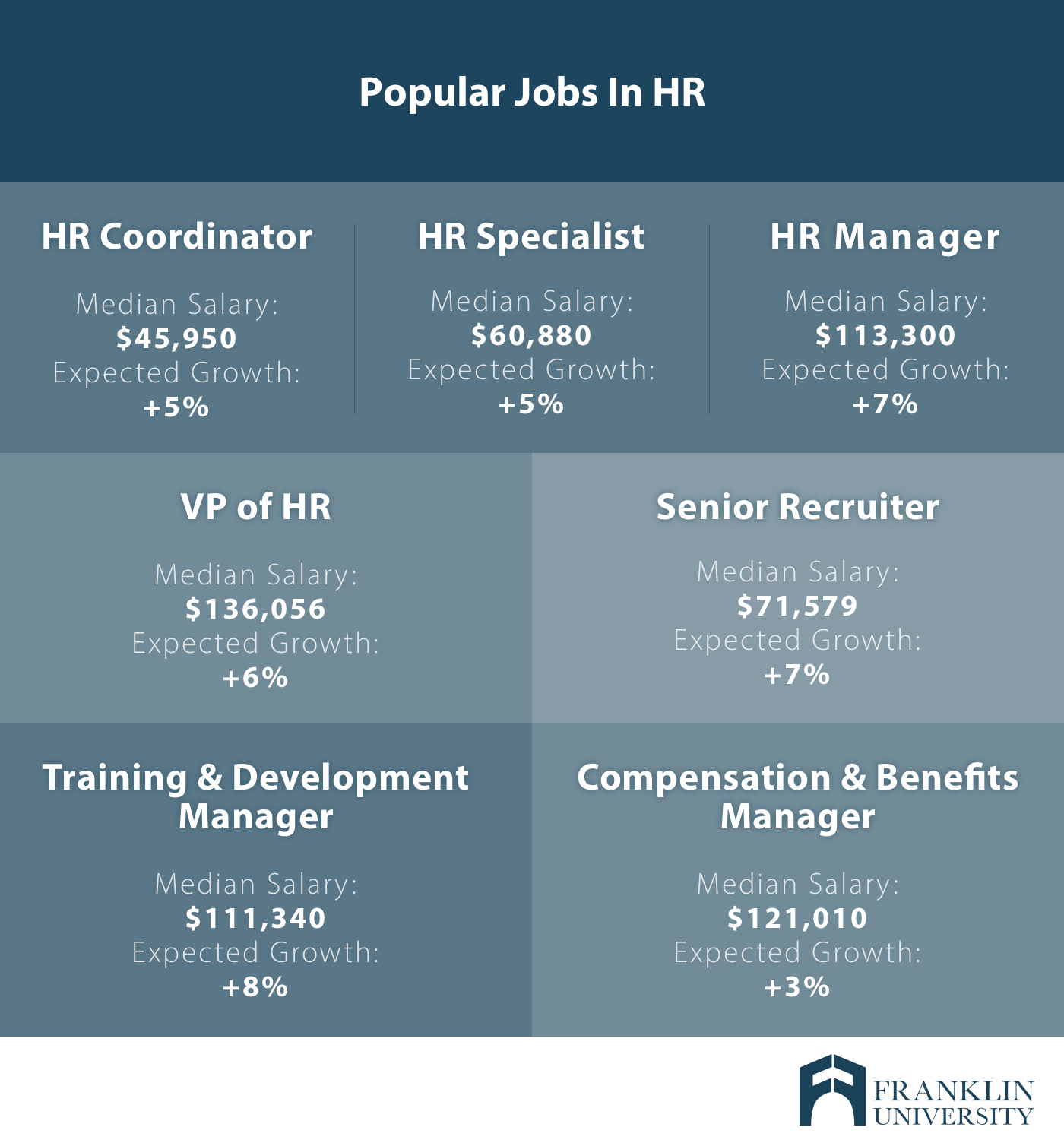Request Information
We're Sorry
There was an unexpected error with the form (your web browser was unable to retrieve some required data from our servers). This kind of error may occur if you have temporarily lost your internet connection. If you're able to verify that your internet connection is stable and the error persists, the Franklin University Help Desk is available to assist you at helpdesk@franklin.edu, 614.947.6682 (local), or 1.866.435.7006 (toll free).
Just a moment while we process your submission.

What Degree Do You Need for Human Resources Careers & Advancement?
Every organization in the world—no matter how large or small—requires people. Even the most technologically advanced companies still need employees to innovate and advance their business.
Enter the HR department. Human resources is the all-important important link between the company’s needs and the needs of its employees. Leaders in this department are responsible for attracting and retaining the best talent for the organization. It fulfills this role through a wide variety of functions like recruitment, training, compensation, and benefits.
This makes human resources pivotal to the success of an organization—translating to an extremely stable career for HR professionals.
But how do you gain the specific skills you need to work across or specialize in these functions? That’s where a degree in human resources comes in. If you’re looking to break into the human resources field, or already work in HR and want to get ahead, this article will help you determine which human resources degree is right for your goals.
3 Degrees and Three Professional Certifications That Will Advance Your Career in HR
In the past, many human resources professionals came from a generalized educational background, from business administration to social sciences. As competition for talent continues to increase and processes like benefits administration get more complicated, companies are looking for professionals who are trained in industry best practices.

Luckily, there’s no shortage of options when it comes to specialized human resources education. Let’s look at different HR degrees and certifications, and the professionals who are best suited for each path.
The Associate Degree in Human Resource Management
Who: If you’re looking for a quick way to kick start your HR career, an associate degree can get your foot in the door.
Why: An associate’s degree in human resources will prepare you for entry-level positions in the human resources field where you provide general administrative support.
How: A typical associate’s degree in human resources takes two years to earn. You will take general education courses, like math and English, as well as HR-specific coursework like project management, compensation and benefits, and training and development. Most professionals who get their associate’s degree in human resources go on to complete a bachelor’s degree in order to advance their careers.
The Bachelor’s Degree in Human Resource Management
Who: A bachelor’s degree in human resources is ideal for people with no professional experience who want to get an entry-level position in HR or professionals with an associate’s degree looking to advance their career beyond the entry-level.
Why: A bachelor’s degree will give you higher starting salaries and a long runway for career advancement as you gain professional experience.
How: A Bachelor’s in Human Resource Management is typically a four-year degree. A bachelor’s degree provides both a broad and deep education in human resources. Take basic concepts to the next level as you complete courses that teach skills like:
- Evaluating staffing levels to make hiring decisions
- Developing employee training and development programs
- Understanding employee and labor relation best practices
- Researching compensation and benefits packages
By pursuing a bachelor’s degree in HR, you will not only learn the basic theories of human resource management, but you’ll also practice applying those theories to real-world situations.
When it comes to paying for school, grants are among your best options. But do you know how to find them? Remove the guesswork by downloading this free guide.
The Master’s Degree in Human Resource Management
Who: If you’ve been working in HR for a while and want to advance to management or executive levels, a master’s degree might be your next step. It can also be a great option for people with professional experience in another field looking to make the switch to HR.
Why: You want to get a seat at the leadership table and help inform the strategic direction of your organization.
How: A Master’s in Human Resource Management usually takes anywhere from 16 to 24 months to complete. A master’s degree prepares you to be a strategic partner at the executive level, helping companies gain a competitive advantage through talent acquisition and retention. You’ll take advanced coursework that explores and applies issues like:
- Strategic resource planning
- Compensation design and pay equity
- Employee rights and responsibilities
- International human resource management
Master’s programs emphasize collaboration, creative problem solving and critical thinking, which will also improve your leadership skills to help you advance your career.
Professional Certifications in Human Resource Management
Professional certifications in human resources show your expertise and can boost your pay. While there are many different certifications in HR, these are three of the most popular.
- SHRM Certified Professional (SHRM-CP): This certification proves you understand the behavioral competencies required to effectively apply your HR knowledge in the modern workplace to support organizational goals.
- Professional in Human Resources (PHR): The PHR demonstrates your mastery of the technical and operational aspects of HR management, including U.S. laws and regulations.
- Global Professional in Human Resources (GPHR): The GPHR demonstrates your expertise in multinational HR responsibilities, including the development of HR policies and initiatives that support global growth.
Choose Your Degree Based on the Human Resources Job You Want

In human resources, there are two career paths: generalist and specialist. Someone who chooses a generalist career path will seek out jobs that involve all functions of human resources, while a specialist will choose a job dedicated to one of those functions.
Let’s look at how your career can progress as a generalist, starting as an HR coordinator, or how you can branch-off your career into a specialist role dedicated to functions like recruiting, benefits or training.
Human Resource Coordinator
A human resource coordinator is the most entry-level job for HR professionals. This role focuses on the administrative side of human resources, posting job listings, reviewing resumes for baseline qualifications and processing employee paperwork.
- Median Salary: $45,950 per year (Payscale)
A human resource coordinator will typically have an associate’s or bachelor’s degree in human resources. If you enter this career with an associate’s degree, you may need more experience, education or certifications to compete for advancement opportunities.
Human Resource Specialist
Human resource specialists are trained in all facets of human resources and perform tasks throughout all areas of the department—from recruiting to onboarding and benefits to compensation.
- Median Salary: $60,880 per year (BLS)
A bachelor’s degree is the typical entry-level education for an HR specialist. Most of the time, professionals have a bachelor’s degree in human resources because they are ready to make an impact from day one.
Human Resource Manager
Human resource managers plan and direct the administrative functions of an organization. They oversee the department and contribute to strategic planning, serving as a link between an organization’s executive management and its employees.
- Median Salary: $113,300 per year (BLS)
Becoming an HR manager requires a minimum of a bachelor’s degree and around five years of experience. To accelerate your career and stand out from other candidates, pursue a master’s in human resources.
VP of Human Resources
The VP of human resources oversees contracts, develops written policies, monitors legal compliance for workplace regulations, all while leading a team of other HR professionals.
- Median Salary: $136,056 (Payscale)
The VP of Human Resources will commonly have a master’s degree because of their strategic and financial responsibilities within the company.
Senior Recruiter
A senior recruiter specializes in finding, interviewing and hiring new talent. They create a strategic approach to attracting the best-fitting prospective employees at compensation levels that fit within budget parameters.
- Median Salary: $71,579 (Payscale)
Senior recruiters must have a bachelor’s degree in human resources or a related field and larger companies may prefer individuals with a master’s degree.
Training and Development Manager
Training and development managers plan and coordinate professional development programs that enhance the knowledge and skills of an organization’s employees, and at larger companies, may oversee a team.
- Median Salary: $111,340 per year (BLS)
A bachelor’s degree is the minimum education for a training and development manager. Some employers prefer or require training and development managers to have a master’s degree with a concentration in human resources management.
Compensation and Benefits Manager
Compensation and benefits managers plan, develop, and oversee programs to compensate employees—from salaries and bonuses to healthcare, retirement and life insurance.
Median Salary: $121,010 per year (BLS)
Compensation and benefits managers typically need a bachelor’s or master’s degree, with a preference for specialized degrees in human resources.
Find the Right Human Resources Degree Program for You
Wherever you are in your career, a human resources degree can be a stepping stone to a well-paying, rewarding career with high stability.
A Franklin University, we offer two human resources degrees—a B.S. in Human Resource Management and an M.S. in Human Resource Management. Both of these programs are tailored to the needs of working adults and designed to give you real-world skills you can apply immediately. Explore these programs to see how they can help you advance your career.





